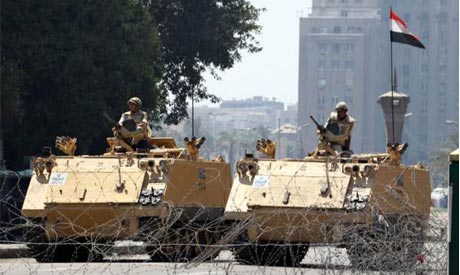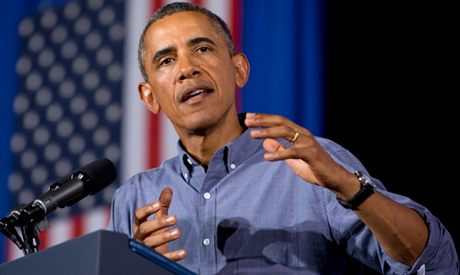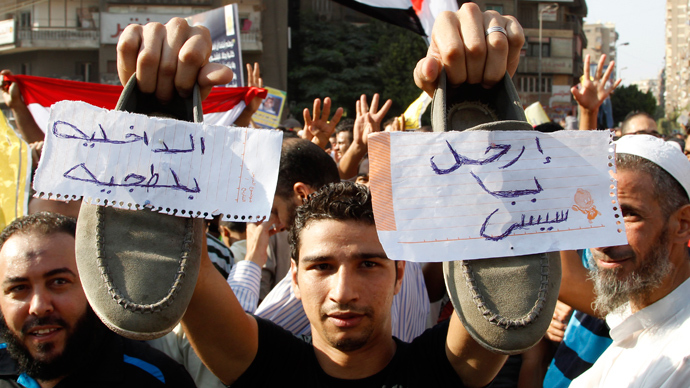http://rt.com/news/egypt-subdued-thousands-921/
( Muslim Brotherhood appears broken for now... )
Thousands turn up for subdued Egypt protests
At least 54 people were injured in protests held across Egypt as thousands participated in the ‘Friday of Martyrs’ calling for more demonstrations against the military’s removal of the deposed President Mohammed Morsi.
Mass protests, which were organized by Egypt's Muslim Brotherhood, failed to bring out a high number of people, as the movement struggles to emerge from a bloody army crackdown on its followers.
One person died in clashes in the Nile Delta town of Tanta, 27 were injured in Cairo, 25 in Gharbiya and two in Daqahlia, according to the Health Ministry.
Egyptian security adopted low-level security measures, but put Cairo under an intensive lockdown from dawn as pro-Muslim Brotherhood demonstrators and their allies planned to participate in a day of protests, dubbed the “Friday of Martyrs,” which had prompted fears of more bloodshed across the nation’s capital.
“We are willing to sacrifice our lives” protesters chanted as they marched through the capital’s Nasr city district. “We promise the martyrs that we will end military rule.”
Calls for widespread marches had been made, drawing several thousand people, which while still large, was in stark contrast to the hundreds of thousands staking out the city’s squares over the course of the past month. Fighting was minimal in comparison to the bloody devastation Egypt has witnessed in recent weeks.
Armored vehicles and soldiers were deployed to key areas in the city, with mosques and main streets covered. Tahrir Square was barricaded with a forceful military presence, and the presidential palace and Rabaah al-Adawiya mosque were similarly blocked.
The mosque was the site of a weeks-long sit-in, which was broken up less than two weeks ago. Hundreds were killed in the process.
The crackdown on protesters has been a harsh blow to pro-Morsi protesters. Several hundred people have died in the suppressions of protest camps and clashes with military forces as squares were raided this month.
Some 2,000 Islamists also rallied in Cairo’s middle class Muhandesseen neighborhood and some 5,000 gathered in the upmarket suburb of Maadi. “The interior ministry are thugs,” the protesters chanted.
Police fired tear gas to scatter demonstrators after they clashed with civilian opponents. 15 Islamists were arrested during the same conflict, according to officials.
http://english.ahram.org.eg/NewsContent/1/64/79767/Egypt/Politics-/ProMorsi-mobilisation-feeble-after-crackdown-on-Eg.aspx
Egypt’s Muslim Brotherhood is struggling to maintain its incessant protests that have kept security forces on their toes since a bloody crackdown on the group’s Cairo sit-ins last week left over 600 dead and thousands injured.
A low turnout on Friday suggests that the Brotherhood may find it difficult to heap more pressure on an army-backed government that is emboldened by the backing of the majority of Egyptians as it seeks to end the resistance of the 85-year-old Islamist group.
What explains the smaller turnout at Friday's marches calling for Mohamed Morsi's reinstatement? Does the Muslim Brotherhood have a future? Ahram Online asks an expert and a former Brotherhood member.
Low turnout analysed
Political analyst and former MP Amr El-Shobki said the low turnout could be attributed to two reasons. First, the security forces pursuing the Brotherhood's leaders and charging them with "terrorism and inciting violence."
The likes of Brotherhood Supreme Guide Mohamed Badie, deputy leader Khairat El-Shater, leading member Ahmed Abu Baraka and spokesman Ahmed Aref were rounded up. Security forces are also in the hunt to arrest other leading members, including Mohamed El-Beltagy and Essam El-Erian.
The likes of Brotherhood Supreme Guide Mohamed Badie, deputy leader Khairat El-Shater, leading member Ahmed Abu Baraka and spokesman Ahmed Aref were rounded up. Security forces are also in the hunt to arrest other leading members, including Mohamed El-Beltagy and Essam El-Erian.
The arrests have affected the group's ability to mobilise their supporters, El-Shobki added. Brotherhood members, known for following a strict hierarchy, suddenly find no one to direct them.
"The curfew and strict security measures did not affect the marches as much as the arrest of Brotherhood leaders," El-Shobki commented.
The second reason, according to El-Shobki, is the "complete absence of sympathy and support for the Brotherhood" after Mohamed Morsi's "failed one-year."
Indeed, local residents attacked pro-Morsi marches in a number of Egyptian governorates on Friday, leaving at least one Morsi supporter dead and 25 injured in the Nile Delta city of Tanta. Police used teargas to disperse the crowd.
Friday witnessed far fewer casualties than the same day last week when more than 100 were killed in clashes pitting Morsi supporters against security forces, two days after police dispersed pro-Morsi sit-ins in Cairo's Rabaa Al-Adawiya and Giza's Nahda Square.
Mohamed El-Kassas, a former Muslim Brotherhood youth and current member of the Egyptian Current Party, said police intimidation was behind Friday's reduced turnout.
"Live bullets were fired from the first minute at last week’s protests," El-Kassas stated.
Brotherhood’s next step
For the Brotherhood to play a continued role in Egyptian politics, its younger members must take the lead, El-Shobki said. The group must also abandon its religious basis and instead adopt a political focus.
"[They] should stop acting as if they are above the law," El-Shobki asserted, referring to the group’s religious identity and preaching mission.
There is no law in the now-suspended 2012 constitution banning a political party from embracing a religious identity. However, the current 50-member committee, delegated by the interim president to draft amendments to the suspended constitution, may suggest an article banning political parties with a religious ideology.
The Brotherhood is unlikely to relinquish its religious identity any time soon, El-Shobki added.
On the other hand, El-Kassas finds the possibility of younger members taking charge of the group unlikely. The arrest of their leaders will make the youth even more loyal towards them, El-Kassas predicts.
Violence on the cards?
Following Morsi’s ouster, militant attacks on police and army checkpoints have taken place on daily basis, raising fears that the Brotherhood might resort to violence.
Following Morsi’s ouster, militant attacks on police and army checkpoints have taken place on daily basis, raising fears that the Brotherhood might resort to violence.
Military spokesperson Ahmed Ali said on Friday that Egyptian security forces had killed 78 suspected militants, including 32 foreigners, in recent operations in the Sinai Peninsula.
El-Shobki stated that “some” Brotherhood members "might resort to terrorism". "Some have already been seen carrying weapons on the streets," he added.
"Terrorist attacks" in Cairo, if any, will be rare with no actual impact, he predicts.
The Brotherhood repeatedly insisted they would only resort to peaceful means in pursuing their aims.
The Brotherhood repeatedly insisted they would only resort to peaceful means in pursuing their aims.
Al-Gamaa Al-Islamiya, which backs Morsi and is a close ally of the Muslim Brotherhood, is infamous for using violence against the Mubarak regime in the 1980s and 1990s.
After Morsi’s 3 July overthrow and the bloody dispersal of two pro-Morsi sit-ins, some analysts feared it would return to violence.
However, Aboud El-Zomor, a leading figure in the group, recently told Time Magazine that it would not return to violence.
"This is a final decision,” he said. “We choose the peaceful political direction as our way, even in opposition. When we are now opposing the new, illegal government, we are going to oppose it with the tools of democracy."
"This is a final decision,” he said. “We choose the peaceful political direction as our way, even in opposition. When we are now opposing the new, illegal government, we are going to oppose it with the tools of democracy."
El-Zomor spent 30 years in Egyptian prisons in connection with the 1981 assassination of former president Anwar Sadat.
http://english.ahram.org.eg/NewsContent/1/64/79750/Egypt/Politics-/Egypt-killed--militants-in-recent-operations-in-Si.aspx
Egyptian security forces have killed 78 suspected militants, including 32 foreigners, in recent operations in the Sinai Peninsula, military spokesperson Ahmed Ali said on Friday.
The operations injured around 116 people, Ali added via his official Facebook page.
Ali confirmed that 203 people, including 48 foreigners, had been arrested for their alleged involvement in attacks on security checkpoints in the peninsula.
He also said that 343 tunnels on the border between Egypt and Gaza at Rafah have been destroyed.
Last Tuesday, at least 25 Egyptian policemen were killed when suspected militants ambushed a personnel carrier near Rafah.
In August 2012, an attack by unknown assailants killed 16 army conscripts in Rafah. Then-president Mohamed Morsi conducted a security reshuffle that saw army intelligence chief Abdel-Fattah El-Sisi appointed defence minister.
Attacks against security forces have escalated since Morsi's ouster. Sixty people have reportedly been killed in attacks on security checkpoints in Sinai since Morsi was deposed by the military on 3 July amid mass protests against his rule.
Egypt - Protests after Friday prayers - Friday of martyrs march ....
UPDATE: Thousands of pro-Morsi demonstrators take the streets in Egypt amid tightened security
Thousands of pro-Morsi demonstrators take to streets in Cairo and several provinces decrying Morsi's ouster and killing of hundreds of protesters last week, army and police forces tighten security at protest sites
Ahram Online , Friday 23 Aug 2013

Egyptian soldiers stand guard as they close one of the entrances to Tahrir Square in Cairo August 23, 2013. (Photo: Reuters)
Demonstrations marched through the Cairo districts of Ramsis, Mohandeseen, Helwan, Haram and Shubra.
The Governorates of Aswan, Suez and Fayoum also witnessed protests, with hundreds of participants in each.
Protesters chanted "[Defence Minister Abdel-Fattah] El-Sisi is a traitor" and "It is not about the Brotherhood…it’s a war against Islam" .
"El-Sisi is a traitor…Morsi is my president" and "The media are liars…peacefulness in not terrorism," were also among the chants.
Demonstrators carried pictures of Morsi and of those slain during last week's clashes with police . Widely carried were also the yellow banners with the now well-known "Rabaa hand" showing a four-finger salute symbolizing the violent crackdown on the Rabaa Al-Adawiya Mosque last week, which left more than 700 killed and thousands injured.
Egyptian army and police forces are tightening security at several prominent protest sites in Cairo.
The National Alliance to Support Legitimacy, an Islamist coalition against the ouster of president Mohamed Morsi led by the Muslim Brotherhood, announced that it would stage 28 marches across greater Cairo on Friday departing from major mosques. The demonstrations, dubbed the "Friday of Martyrs," aim to condemn the fall of Brotherhood supporters in recent violence following the police's deadly crackdown on the Islamist sit-ins last week, leaving over 700 dead.
Army and police forces have spread over the vicinity of Rabaa El-Adawiya Mosque in Nasr City, where the alliance held its main sit-in for six weeks before the dispersal. They have closed off several nearby streets.
They also increased their presence at the nearby defence ministry and the Ittihadeya presidential palace in Heliopolis district, a few kilometres away from Rabaa El-Adawiya.
In addition, army forces have closed off all entrances to Tahrir Square in central Cairo with tanks and barbed wire.
Tahrir has been a site for anti-Brotherhood demonstrations and currently hosts several tents of protesters who opted to defend the area in case Morsi supporters attempt to take over the iconic square.
Meanwhile, the army also closed off Gam'et El-Dowal El-Arabiya Street, a main route in Mohandiseen district which intersects with the square where Mostafa Mahmoud Mosque is located. Immediately after dispersing the sit-ins last week, Islamist protesters attempted to set up a new sit-in in front of the mosque, but fierce clashes broke out with security forces and the crowd was quickly dispersed.
Three days after the dispersals, in response to violent clashes that followed nationwide, the alliance announced it would hold a week of rallies in protest. However, the turn out across the past week has been relatively small in numbers.
Fourteen governorates, including Cairo, Giza and Alexandria, are under a state-imposed curfew from seven o'clock in the evening to six o'clock in the morning. A one-month long state of emergency was also announced nationwide last week.
Cutting Egypt aid may not reverse actions: Obama
US has to be careful of looking like it is aiding and abetting actions that go contrary to US values - Obama tells CNN
AP, Friday 23 Aug 2013

President Barack Obama (Photo: AP)
But he says the U.S. must be "very careful" about being seen as aiding and abetting actions that run contrary to the country's values.
Obama administration officials are weighing whether to cut off more than $1 billion in annual aid to Egypt after the military-backed interim government cracked down on supporters of ousted President Mohamed Morsi.
Obama defended his decision to hold off in cutting aid, saying there was a period of time after Morsi was ousted where the U.S. needed to use diplomacy to encourage the military to seek reconciliation. He says that was the right approach, even though the military "did not take that opportunity."
Obama spoke on CNN.
8/20/2013



No comments:
Post a Comment